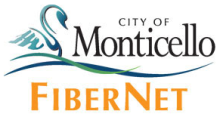Small Minnesota Town, Annandale, Fed up With Slow DSL
Yet another Minnesota town is fed up with slow, unreliable Internet access and is examining what it can do to make sure it has the network it needs to succeed in the modern economy. Annandale is 50 miles northwest of Minneapolis with a population of 3,200 and has Windstream as the telephone company.
Windstream, as with other large firms that primarily serve rural America, offers a DSL more suited to the late 1990's than 2013. It has little capacity to invest in better networks, even if it had the willingness. We've covered Windstream several times in previous stories.
After a flood of complaints from residents to City Hall about slow speeds and frequent outages, the City issued a request for proposals for a feasibility study that will explore alternatives to the present reliance on Windstream.
Local leaders understand that the private sector is not likely to invest significantly in its community due to its density and rural location. But the town needs modern Internet access to retain and attract good jobs. The Annandale Advocate newspaper ran a story on September 17 but it is not available for non-subscribers.
 The same paper published a guest editorial by City Council members to explain how little power the City has over private providers. Many people falsely believe that towns are actively keeping competition out:
The same paper published a guest editorial by City Council members to explain how little power the City has over private providers. Many people falsely believe that towns are actively keeping competition out:
At a chamber of commerce meeting later in the week Gunnarson added that strong broadband is a basic, essential feature of modern commerce. "New businesses expect good Internet. When you buy a car you expect tires on it. Unfortunately, our car has wooden tires," he said.
 The same paper published a guest editorial by City Council members to explain how little power the City has over private providers. Many people falsely believe that towns are actively keeping competition out:
The same paper published a guest editorial by City Council members to explain how little power the City has over private providers. Many people falsely believe that towns are actively keeping competition out:
We even had some people angrily ask our staff why are we keeping the competition out. So to set the record straight, the city can't do much about it because it is all private wires, equipment, operations and corporate customer service. Also, a recent call to the PUC, the Public Utilities Commission, confirms that not much can be done since broadband is not regulated. Sorry folks. As far as letting in competition, we have zero say in that. Any other provider can come in any time.



